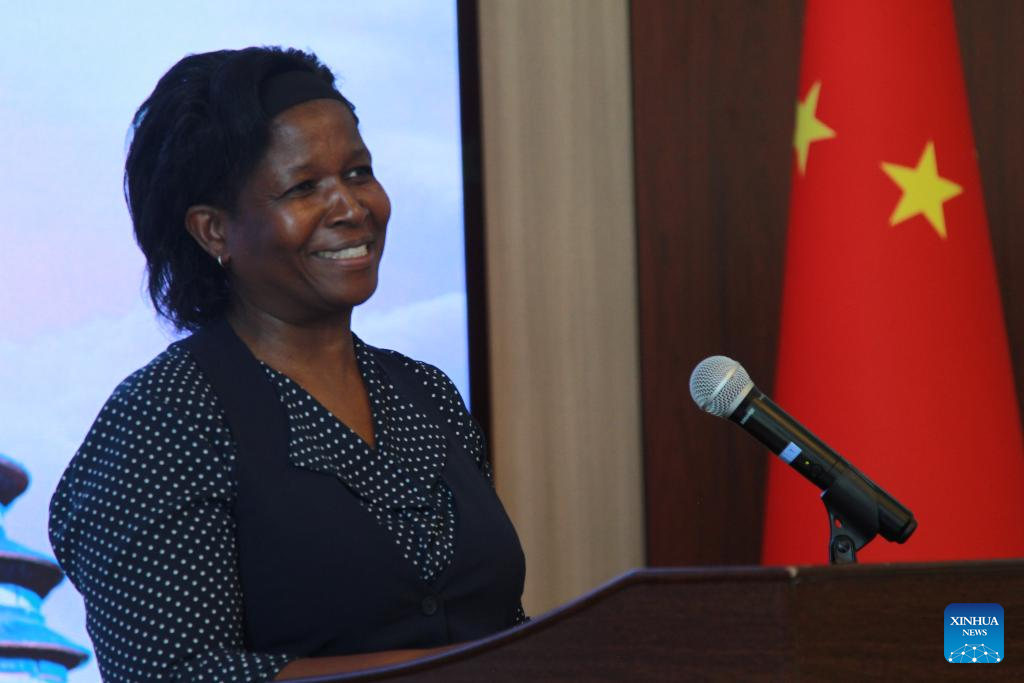China, Zimbabwe cooperation enhances human resources development

Zimbabwe's Deputy Minister of Public Service, Labor and Social Welfare Mercy Dinha speaks at a reception for the China-Zimbabwe human resources development cooperation at the Chinese Embassy in Harare, on Jan. 29, 2024. Government officials on Monday said cooperation between China and Zimbabwe in skills capacity has enhanced human resources development in the Southern African country. (Xinhua/Tafara Mugwara)
HARARE, Jan. 29 (Xinhua) -- Government officials on Monday said cooperation between China and Zimbabwe in skills capacity has enhanced human resources development in the Southern African country.
"The impact of this cooperation has been profound, fostering the development of outstanding officials and professionals who have gone on to contribute significantly to the economic and social advancement of their home countries," Zimbabwe's Deputy Minister of Public Service, Labor and Social Welfare Mercy Dinha said during a reception for the China-Zimbabwe human resources development cooperation held at the Chinese Embassy in Harare, the capital of Zimbabwe.
Zimbabwean government officials, officers from the Public Service Commission, government employees, and beneficiaries of the China-Zimbabwe human resources development cooperation attended the reception.
Dinha said the extensive decades-long history of China's engagement in human resources development with Zimbabwe reflects the depth of China's dedication to sharing its knowledge, expertise, and resources with developing countries.
"I would like to commend China's human resources development cooperation for its broad and inclusive approach, encompassing a vast array of sectors spanning from traditional fields such as agriculture and forestry to cutting-edge domains like 5G communications, satellite navigation, and artificial intelligence," she said.
The comprehensive approach ensures that Zimbabwean participants have access to training and education in areas that are crucial to the modernization and advancement of the country, noted Dinha.
In addition, she said the diversified range of training models offered by China, including degree programs, online courses, and tailored training, reflects a deep understanding of the diverse needs and contexts of partner countries like Zimbabwe.
"This multifaceted approach ensures that participants are equipped with the knowledge and skills that are directly relevant to the development priorities and challenges of Zimbabwe," she said.
In his address at the reception, Chinese Ambassador to Zimbabwe Zhou Ding said China's assistance to developing countries is focused not only on fields such as infrastructure, industrial and agricultural production and healthcare improvement but also on skills development and experience sharing.
In the past 20 years, China has trained more than 160,000 African talents including over 6,000 Zimbabweans, Zhou noted.
"What is equally important is, through these training programs, the people-to-people exchanges between our two countries have been strengthened, and the traditional friendship between us has been further consolidated," Zhou added.
China will carry out more human resources development programs and help Zimbabwe cultivate more talents and realize its modernization and industrialization, said Zhou.
Kudakwashe Machako, director of Provincial Coordination for Midlands Province in the Office of the President and Cabinet, a beneficiary from a Master's Degree Program in Public Administration at Peking University under a Chinese scholarship program, said the cooperation is beneficial in the country's human capacity development.
"Guided and motivated by both historical legacies and strategic policy pronouncement by our two countries, the scholarship program provided the vital platform for personal career development, improved performance and inculcation of confidence and the right attitude and character towards national development," said Machako at the reception.


